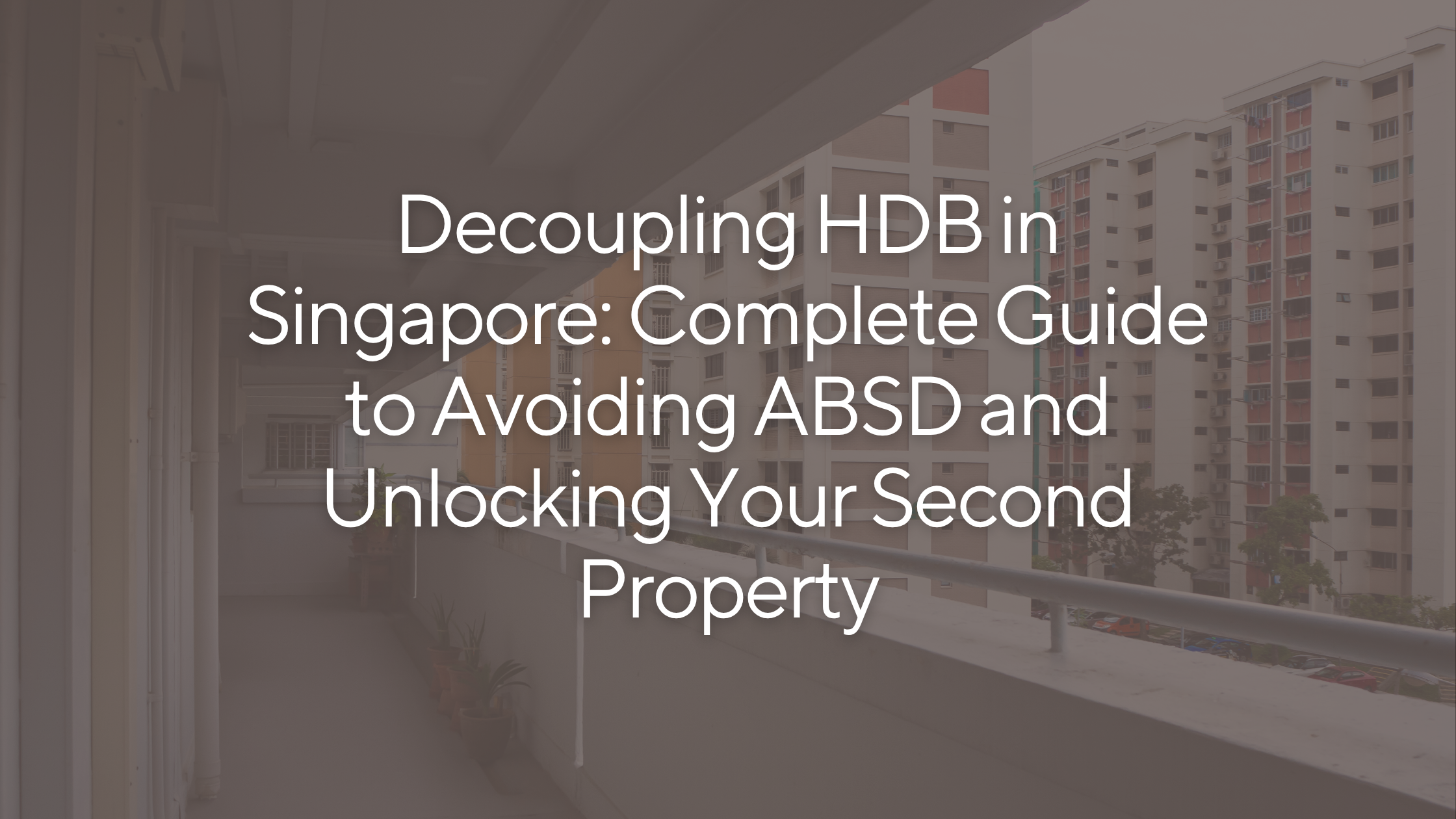Decoupling HDB in Singapore: Complete Guide to Avoiding ABSD and Unlocking Your Second Property
You can no longer decouple an HDB flat in Singapore, as HDB has closed this loophole. The only way to “decouple” an HDB is through a divorce, where the court orders a transfer of ownership. However, Executive Condominiums (ECs) can be decoupled after the 5-year Minimum Occupation Period (MOP), since they are treated as private property. In all cases, CPF refunds and accrued interest must be settled, and engaging a decoupling lawyer is essential to ensure compliance.
Decoupling HDB once referred to the process of removing one co-owner’s name from an HDB flat, allowing the outgoing party to purchase another property without paying Additional Buyer’s Stamp Duty (ABSD). However, this option is no longer available.
HDB has closed the decoupling loophole. Today, the only way to “decouple” an HDB flat is through a divorce, where ownership transfer is ordered by the court as part of ancillary matters. For those considering property restructuring, the focus has shifted to Executive Condominiums (ECs), which can be decoupled after the 5-year Minimum Occupation Period (MOP).
Key Takeaways
You cannot decouple an HDB flat through transfer of ownership.
The only way to decouple an HDB is through a divorce settlement ordered by the court.
ECs can be decoupled after fulfilling the 5-year MOP, as they are then treated like private properties.
CPF refunds and accrued interest must still be addressed when ownership is transferred.
A decoupling lawyer is essential for navigating divorce-related transfers and EC decoupling.
Can You Decouple an HDB Flat?
No. HDB flats cannot be decoupled by a simple transfer of ownership. Unlike private property or ECs, HDB flats are subject to strict rules designed to prevent speculative ownership.
The only exception is through a divorce, where:
The court may order one party to transfer their share to the other.
CPF funds and accrued interest must still be refunded.
Any outstanding housing loan will need to be refinanced or cleared.
What About Executive Condominiums (ECs)?
Unlike HDB flats, Executive Condominiums can be decoupled after the 5-year Minimum Occupation Period (MOP). At this point, ECs are considered private property.
Owners may then transfer one party’s share to the other via:
Sale & Purchase (S&P) Agreement – where one party buys over the share, possibly incurring stamp duty.
Deed of Gift – where ownership is transferred without monetary consideration, but CPF refunds are still required.
This allows one party to become a “first-time buyer” again and purchase another property without paying ABSD.
CPF Refund Obligations
Whether through divorce-related HDB transfer or EC decoupling, CPF refund rules still apply. Parties must refund:
The CPF monies used for the property purchase, and
The accrued interest that would have been earned.
Failure to refund CPF properly can delay or prevent completion of the ownership transfer.
Do You Need a Lawyer?
Yes. A decoupling lawyer plays a critical role in:
Advising on whether EC decoupling or divorce transfer applies to your situation.
Handling CPF refund compliance and bank refinancing.
Drafting the legal agreements (S&P or Deed of Gift for ECs, or court-related transfers in divorce).
Ensuring your property restructuring is legally sound and ABSD savings are protected.
Visit our Property & Finance Law or Our Team page for more information.
Risks to Consider
HDB ownership cannot be decoupled unless through divorce.
EC decoupling comes with costs such as stamp duty, CPF refunds, and legal fees.
Loan eligibility: the remaining owner must qualify for refinancing if there is an outstanding loan.
Estate planning: changes in ownership may affect your Will or LPA.
Conclusion
Decoupling HDB flats is no longer allowed—the loophole has been closed. Today, the only way to decouple an HDB is through a divorce. However, if you own an Executive Condominium, you can decouple after the 5-year MOP, when the EC is treated as private property.
Before making any decisions, it’s essential to consult an experienced decoupling lawyer to review your options, calculate CPF refunds, and ensure compliance with the law.
Contact us today:
📞 +65 8780 2499
📷 Instagram: @yylee_familylaw
FAQ
-
No, HDB no longer allows decoupling through transfer of ownership. Only divorce may result in a transfer.
-
Yes, after the 5-year MOP, ECs are treated like private property and can be decoupled.
-
Yes, CPF monies used and accrued interest must always be refunded.
-
Yes, if done via Sale & Purchase. For gift transfers, CPF refunds and loan clearance are still required.

